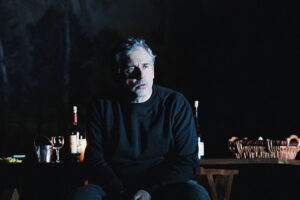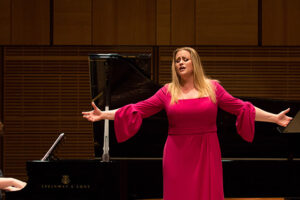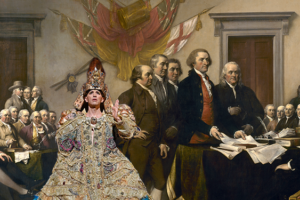

If last week’s Cléopátre concert —same theatre, entirely different ensemble—sounded underrehearsed and underpowered, tonight was about as polished as one could hope for an opera-in-concert. (The Semiramide team did have the advantage of two performances in Lyon last week.) Rossini’s masterwork—the final opera he wrote in Italy before moving to France and never looking back—was stripped right down to the bare elements—just a whole lot of musicians in black tie. And boy do they work hard; Rossini’s score is anything but a walk in the park.
Rossini had a tendency to recycle music from his various operas, but here the composer develops some of his most dramatically engaging musical ideas and certainly some of his most robust and intricate orchestrations, choruses, arias, and duets. It takes a conductor with a certain degree of courage and significant stamina to do Rossini justice and sustain the necessary crispness over two extremely long acts. Fortunately Maestro Pidò was more than up to the task, although not everyone enjoyed his contribution (more on that later).
Semiramide—which was a hit following its premiere in Venice in 1823 but essentially vanished from the repertoire until a landmark mounting in 1962 at La Scala in Milan featuring Australian diva Joan Sutherland—is a vocal feast, but the story is nothing to sniff at either. The opera is based on Voltaire’s tragedy Semiramis, which derives from the legend of Semiramis of Babylon. The plot revolves around Semiramide’s (Romanian soprano Elena Mosuc in a bold performance) announcement of a successor to the throne. When she chooses Arsace (a trouser role for the impressive mezzo-soprano, Ruxandra Donose, also a Romanian), the Assyrian military commander, prince Assur (a robust Michele Pertusi), does not take the news well.
The ensuing tension between Semiramide and Assur sheds light on circumstances behind the death of King Nino. Meanwhile, Idreno, an Indian King (sung by tenore di grazia John Osborn), seizes an opportunity to woo a princess named Azema (Anna Pennisi). The soloists deserve credit for bringing to life this intriguing story with no assistance from a stage director, let alone sets or costumes. Rossini’s music carries us through the emotional turbulence faced by Semiramide and Arcase as the nature of their relationship…changes somewhat (let’s just put it that way).
The singing was universally strong right from the very start, with the exception of Patrick Bolleire (playing the all-knowing High Priest Oroe), although he overcame his initial gruffness of tone. The most complete portrayal was Ms. Donose’s Arsace, the reluctant King. Donose’s voice offers that rare combination of dusky warmth with agility (and no sign of strain, either). She also appeared to enjoy stepping into the shoes of an energetic prince. Donose was consistently impressive in her arias but I found her most exciting singing was in duets with Semiramide and Arsace’s rival, Assur, sung with authority by Pertusi.
Though he is a regular at the Met, my only exposure to Pertusi was through HD broadcasts of bel canto operas like La Sonnambula, though his vocal presence is obviously best appreciated live. His voice shook with (measured) fury in “Deh ti ferma…Que numi furenti,” in which Assur decides he must kill Arsace at the same time as he realizes his popularity ratings are plummeting among the Babylonians.
Mosuc’s Semiramide takes her royal responsibilities extremely seriously and the soprano seemed to be working very, very hard onstage to channel the Queen’s power and pain in her singing. Yet the overall impression was one of iciness—Semiramide isn’t Turandot, right?—and mild discomfort with this admittedly daunting role, which has been sung by a long line of legends, from Isabella Colbran to the aforementioned Sutherland.
Semiramide’s first extended appearance on stage is the highly challenging aria, “Bel raggio lusinghier.” The aria was well sung, but I did not feel any enchantment. I found Mo?uc most moving when, during the second act, Semiramide learns of Arsace’s true identity and accepts whatever revenge he may wish to inflict. Her final aria, “Al mio pregar t’arrendi: il figlio tuo diffendi,” sung just before her almost inevitable death, was also highly moving, with Maestro Pidò providing excellent support.
Last but certainly not least, Mr. Osborn took his single aria, “La speranza più soave” and made it his own, with unique ornamentations that elicited shouts of “bis!” (encore!). Osborn’s Idreno, a King, can have whatever he wants—including the hand of Azema, who can no longer count on marrying Arsace—but he longs for her genuine love. I have not examined Rossini’s score, but Osborn sang much of the aria in mezza voce, never exploding with the exuberance of Juan Diego Florez—until the end, that is.
The orchestra and chorus under Maestro Pidò deserve significant praise. Rossini’s score is not only vast but also extremely exposed, particularly for a quartet of French horns as well as the clarinets and flutes, and these musicians excelled. The opera is also a challenge for the chorus (prepared by Gianluca Capuano), particularly the male side, yet there was not a hint of fatigue or tentativeness.
I really do not know why, amidst roaring ovations for the ensemble and soloists, Maestro Pidò received some rather forceful boos from the second balcony. From my perspective the tempos were well measured and he was sensitive to his singers, never letting the orchestra overpower them. Pidò ran a tight ship and the result was often thrilling, for instance in the ensemble that ends the first act.
This immensely satisfying Semiramide will be broadcast on France Musique on January 10. Be sure not to miss this rare romp through Babylon!
Arguably some heavenly debris made its way to the really intimate Théâtre Louis-Jouvet for a sublime “Lundis musicaux”—a recital featuring soprano Julie Fuchs and pianist Alphonse Cemin. Both of these fast-rising talents toil in the world of ‘serious music’—and indeed they have worked together on recordings of Mahler and Debussy.
But Monday night’s program fixed its gaze on the poems of Louise de Vilmorin, set gorgeously to music by, among others, Francis Poulenc and film composers Georges Auric and Georges van Parys. The result was a delightful evening of songs that finely displayed the versatility (and downright spunk) of these two artists, not to mention their chemistry.
But first, let us recall the tradition of “Lundis musicaux,” with which I was admittedly just introduced. Cemin is 28 and thus he was all of three years old when Pierre Bergé—business partner of the late Yves Saint Laurent (yeah, that guy)—ended his series of concerts at that very same theatre, presenting the grandest voices of the century, from Jessye Norman to Jon Vickers, my compatriot. I wonder what they sang!
But back to the present. de Vilmorin, who was once engaged to Antoine de Saint-Exupéry, said herself that it was her pal Poulenc who encouraged her to write poems destined to be musicalized. Fittingly, therefore, Poulenc’s settings dominated the recital and were certainly the most lyrical, vocally speaking. Fuchs’ singing was emotive and pure, while Mr. Cemin’s accompaniment was simply breathtaking at times. Most memorable was the final set, which included Poulenc’s “Le garçon de Liége,” “Au-delà” and “Aux officiers de la garde blanche.”
The other works on the program were by Auric, van Parys, as well as Jean-Louis Valmont, Pierre Petit (whose “Demain,” an excerpt from his unperformed opera, Migraine, was especially lovely), and Guy Béart. Generally speaking, these pieces required Ms. Fuchs to deploy comédie musicale flair and they often included rapidly spoken text. While I did not understand every word, I caught plenty of irony and ‘Parisian chic sophistication with a dash of Schadenfreude. (Brief audio excerpts from the relevant French films helped to establish this atmosphere).
The mostly full audience ate it up, grateful in particular to Ms. Fuchs for her musical curiosity. May she never lose it, regardless of what is in store for her in the hallowed halls of opera. And as for Mr. Cemin… I think Paris has found her own, younger version of Michael Feinstein for chanson française.
William Christie is perhaps the ultimate American in Paris. Born in Buffalo just before the end of the Second World War, he studied art history at Harvard and the harpsichord at Yale. He opposed the war in Vietnam and moved straight to France in 1971, quickly becoming the world’s preeminent master of French Baroque music. He is now a highly decorated French citizen and his company Les Arts Florissants, has been breathing life into the operas and ballets that once entertained the likes of Louis XV.
I had the opportunity to see Christie and his carefully manicured company of singers, dancers and instrumentalists perform two one-act pieces by Rameau: Daphnis et Églé (1753) and La Naissance d’Osiris (1754). Cité de la Musique was more packed than I have ever seen it. After all, Rameau’s work may be often neglected and dismissed as dramatically lightweight and stagnant (albeit charmingly so), but certainly this attitude is nowhere to be found in Paris.
Staged by Sophie Daneman, the two pieces place equal emphasis on dance and singing. The boisterous members of Les Arts Florissants lent all of their youth and freshness but could not elevate these pieces—first performed to mark the birth of the Duc de Berry, the future Louis XVI—to something resembling dramatic excitement. Daphnis is essentially a pastorale ballet, though it provided us with an opportunity to hear truly lovely singing from Reinhoud Van Mechelen and Élodie Fonnard in the two title roles.
Van Mechelen demonstrated legato and smooth runs in his “arriette vive,” in which he tells smiling onlookers to “chantez vos plaisirs, exprimez vos désirs.” (Regarding the blocking of the chorus… I kept wondering when the clambake would begin—ah, memories of performing in a production of Carousel!). These two singers also reappear as the parents in La Naissance d’Osiris, with Magali Léger offering plenty of exuberance as Pamilie and Pierre Bessière booming—elegantly; this is Fontainebleau—as Jupiter.
Curiously, Christie and his excellent orchestra were situated behind the singers. It appeared the soloists were relying upon their peripheral vision to pick up cues. Is this typical for French Baroque, or was this arrangement simply due to the lack of an orchestra pit?
After feeling unmoved by Castor et Pollux at the Théatre des Champs-Élysées back in October, I was ready to give Rameau another chance. I was delighted to see for myself why people flock to Christie and his gifted ensemble (the freshness and joy with which the chorus sings is worth the price of admission, as is Christie’s quiet but assured leadership), yet I have accepted that French Baroque just isn’t going to be my happy place.























Comments